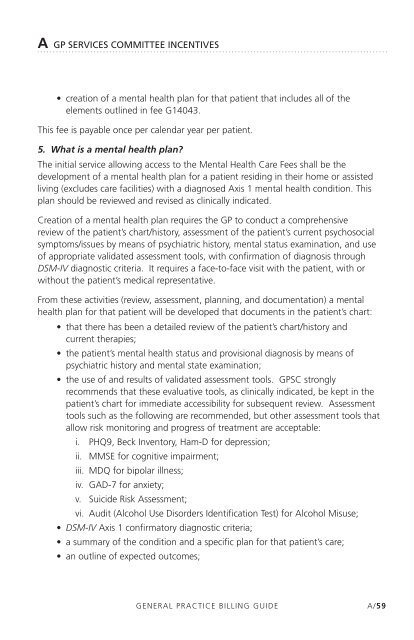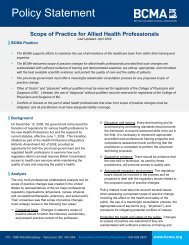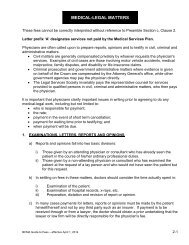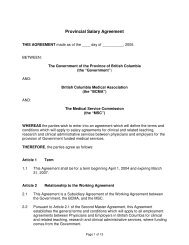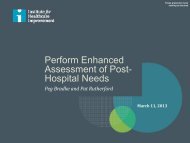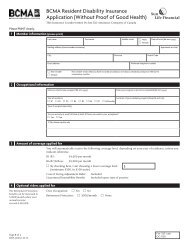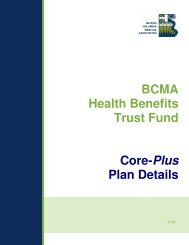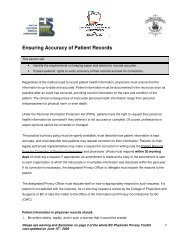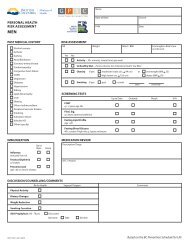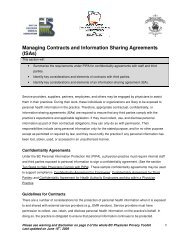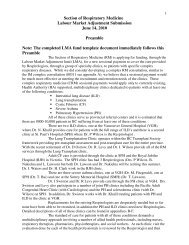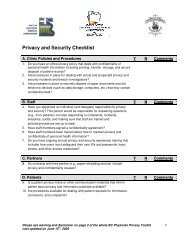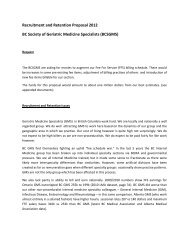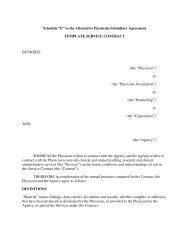General Practice BILLING GUIDE - British Columbia Medical ...
General Practice BILLING GUIDE - British Columbia Medical ...
General Practice BILLING GUIDE - British Columbia Medical ...
Create successful ePaper yourself
Turn your PDF publications into a flip-book with our unique Google optimized e-Paper software.
A GP SERVICES COMMITTEE INCENTIVES<br />
• creation of a mental health plan for that patient that includes all of the<br />
elements outlined in fee G14043.<br />
This fee is payable once per calendar year per patient.<br />
5. What is a mental health plan?<br />
The initial service allowing access to the Mental Health Care Fees shall be the<br />
development of a mental health plan for a patient residing in their home or assisted<br />
living (excludes care facilities) with a diagnosed Axis 1 mental health condition. This<br />
plan should be reviewed and revised as clinically indicated.<br />
Creation of a mental health plan requires the GP to conduct a comprehensive<br />
review of the patient’s chart/history, assessment of the patient’s current psychosocial<br />
symptoms/issues by means of psychiatric history, mental status examination, and use<br />
of appropriate validated assessment tools, with confirmation of diagnosis through<br />
DSM-IV diagnostic criteria. It requires a face-to-face visit with the patient, with or<br />
without the patient’s medical representative.<br />
From these activities (review, assessment, planning, and documentation) a mental<br />
health plan for that patient will be developed that documents in the patient’s chart:<br />
• that there has been a detailed review of the patient’s chart/history and<br />
current therapies;<br />
• the patient’s mental health status and provisional diagnosis by means of<br />
psychiatric history and mental state examination;<br />
• the use of and results of validated assessment tools. GPSC strongly<br />
recommends that these evaluative tools, as clinically indicated, be kept in the<br />
patient’s chart for immediate accessibility for subsequent review. Assessment<br />
tools such as the following are recommended, but other assessment tools that<br />
allow risk monitoring and progress of treatment are acceptable:<br />
i. PHQ9, Beck Inventory, Ham-D for depression;<br />
ii. MMSE for cognitive impairment;<br />
iii. MDQ for bipolar illness;<br />
iv. GAD-7 for anxiety;<br />
v. Suicide Risk Assessment;<br />
vi. Audit (Alcohol Use Disorders Identification Test) for Alcohol Misuse;<br />
• DSM-IV Axis 1 confirmatory diagnostic criteria;<br />
• a summary of the condition and a specific plan for that patient’s care;<br />
• an outline of expected outcomes;<br />
GENERAL PRACTICE <strong>BILLING</strong> <strong>GUIDE</strong><br />
A/59


